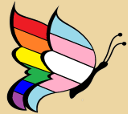I am a non-binary transgender person who has experienced extensive discrimination in my personal and professional life. Every year for seven years I was subjected to at least one major act of dicrimination that left me homeless, led to unemployment, and created barriers to accessing health care. Furthermore, I was the first openly transgender person at my university of Emporia State, in Kansas. From the moment I came out, until very recently, I was often the sole source of information about what it meant to be transgender, along with how to respect those whose gender did not match the assumptions made for them at their birth.
These experiences have driven me to prioritize the education that I wish to do in order to create a world where people like me, and those from vastly different backgrounds from my own, can all be safe and confident in their existence and their story. Thus, as a queer eductator I focus on building skills that enable us to welcome each other, long before we are able to understand what is being shared.
For example, when I was in high school, I didn't know what the word "gay" meant. I was raised in a convservative Evangelical Christian family, and those topics were never discussed. At the same time I was also a misfit and an outcast in my high school, who tended to draw those who were hurting to me because I was kind and open. Thus when a friend came out to me as gay, I was supportive. I told him that I was glad he had confided in me, that I still thought he was an awesome person, and that I was happy to be his friend. What I didn't say, was that I was terrified that he would realize that I had no idea what he had just said.
I tell this story in my workshops to illustrate the ways in which I was able to be there for my friend with no knowledge, and also to highlight my mistakes. Sixteen year old me was too scared to ask the questions that could have led to deeper understanding. I feared the vulnerability, and that made it impossible for us to grow closer. Yet even from that fear, I was able to be present, to affirm my friends experience of himself, and to care. I was able to do this without any training in gender theory, without understanding that sexuality existed beyond a thing to be feared. This openness is a skill that can be learned without a graduate degree in gender theory, or understanding all the labels that currently in use.
It is a skill that I gained gradually, despite the seeds present in high school. My own unfolding from ignorant and isolated teen, to suicidal adult, to confident mentor in the LGBTQIA+, kink, and asexual communities happened over time. I grew because those around me asked questions that challenged my assumptions, they were there for me as I sounded out new realities, and found new beliefs that were closer to my deepest values. Instead of spewing information, they offered it gently, and built a space for me to play with it. These experiences set the foundation for how I motivate people to engage in their own learning about power and privilege.
I have found that to motivate people to change, I need to start with a question, and an invitation. I need to know who they are and where they come from. I need to take the time to learn the language they speak, and to find ways to translate myself into their words. This isn't a diminishing of myself, for I also take time in my own communities to celebrate the richness of words, pictures and feelings that encompass my complexities. Rather, this translation comes from a place of kindness and compassion. Of recognizing that change can be terrifying and intimidating, especially when we feel blamed for not encountering it before. Furthermore it requires a vulnerability, a willingness to be seen. I've found that growth happens when people are safe enough to be mutually vulnerable, and to collaborate on building a language that celebrates all of their experiences. So in my workshops there is more space for conversation then lecture, more room for questions than answers, and space to find in ourselves the motivation to heal our families, communities, and our world.
 On Servants Wings
On Servants Wings
 On Servants Wings
On Servants Wings